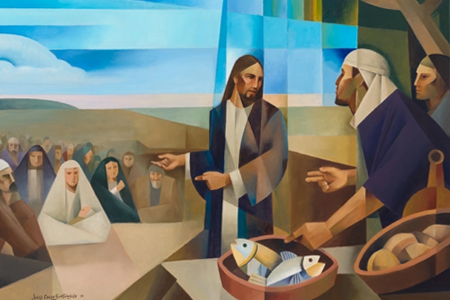Jesus went off to the other side of the Sea of Galilee - or of Tiberias - and a large crowd followed him, impressed by the signs he gave of curing the sick. Jesus climbed the hillside, and sat down there with his disciples. It was shortly before the Jewish feast of Passover.
Looking up, Jesus saw the crowds approaching and said to Philip, ‘Where can we buy some bread for these people to eat?’ He only said this to test Philip; he himself knew exactly what he was going to do. Philip answered, ‘Two hundred denarii would only buy enough to give them a small piece each.’ One of his disciples, Andrew, Simon Peter’s brother, said, ‘There is a small boy here with five barley loaves and two fish; but what is that between so many?’ Jesus said to them, ‘Make the people sit down.’ There was plenty of grass there and as many as five thousand men sat down. Then Jesus took the loaves, gave thanks, and gave them out to all who were sitting ready; he then did the same with the fish, giving out as much as was wanted. When they had eaten enough he said to the disciples, ‘Pick up the pieces left over, so that nothing gets wasted.’ So they picked them up and filled twelve hampers with scraps left over from the meal of five barley loaves.
The people, seeing this sign that he had given, said, ‘This really is the prophet who is to come into the world.’ Jesus, who could see that they were about to come and take him by force and make him king, escaped back to the hills by himself. (John 6:1-15)
Reflection - We are fed that we might feed
Unusually, our reading of St Mark’s Gospel will be interrupted for the next five weeks during which we will read the ‘Bread of Life’ passages from Chapter 6 of St John’s Gospel. These passages form a kind of meditation about who Jesus is and what is happening when we gather for Eucharist - we are being nourished by Jesus in Word and Sacrament, and we are being sent to feed and nourish one another.
In last Sunday’s Gospel, Jesus fed the crowd, hungering for the Word of God, with his teaching. This week, Jesus also feeds the crowd with bread and fish. Once again, Jesus is deeply conscious of the human needs of others. Despite there being so many, not only are all fed, but there is food left over. In the story there is a sense of super-abundance.
When God answers needs and provides for people there is never just enough; there is always more than enough.
Seeing what Jesus had done, the people think they know who Jesus is (“the prophet who is to come into the world”) and what his role should be (a king who will provide anything they want). But they have the wrong idea about Jesus’ kingship. He isn’t a national liberator, a political leader or a magician. So Jesus escapes into the hills by himself.
In next Sunday’s Gospel Jesus will explain what this sign of feeding the multitude is really about.
As we begin this meditation on Jesus, the Bread of Life, our thoughts also turn to how we can be living bread for each other; how we can feed and nourish with the kinds of bread that do not perish: truth, justice, love, kindness, compassion, honesty, integrity, faith, hope and forgiveness.
What words can we speak, what actions can we do that not only feed bodies, but which also feed hearts hungry for comfort, hope, forgiveness, justice, mercy, acceptance and love? How can we be the ‘bread of God’ in our world today?
The ‘food’ is entrusted to us. We are fed that we might feed one another.
You can download and print our prayers and reflections for this Sunday.
pdf
Celebrating At Home 17th Sunday of Ordinary Time [PDF]
default
Celebrating At Home 17th Sunday of Ordinary Time [ePub]















